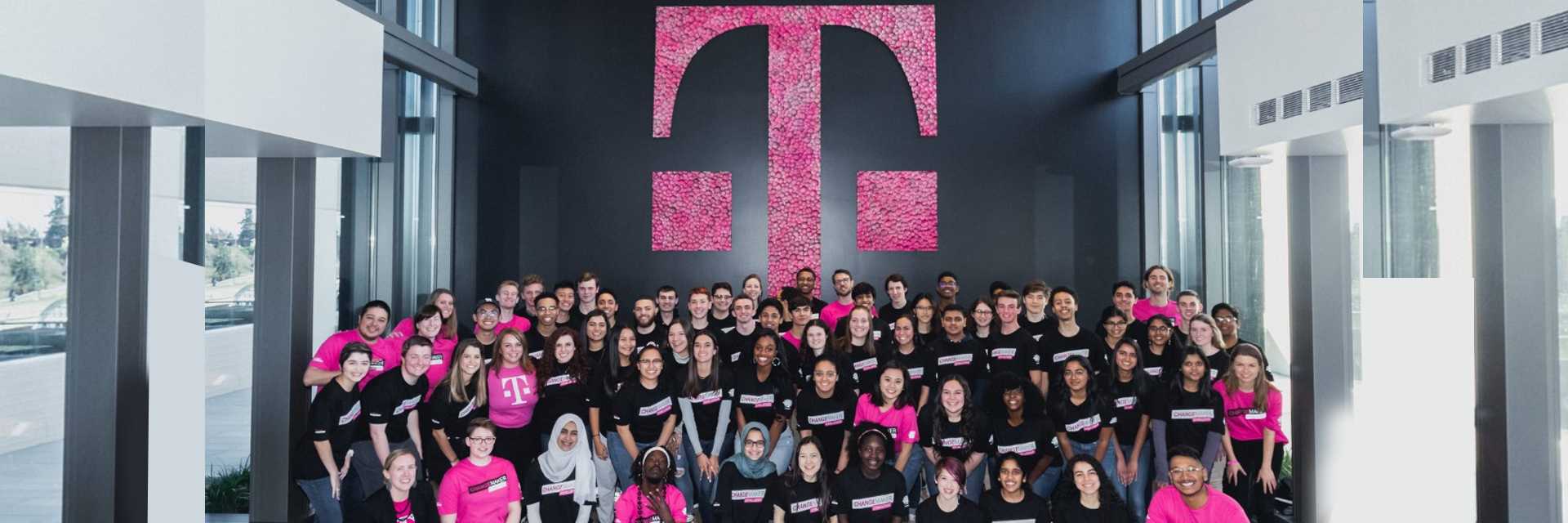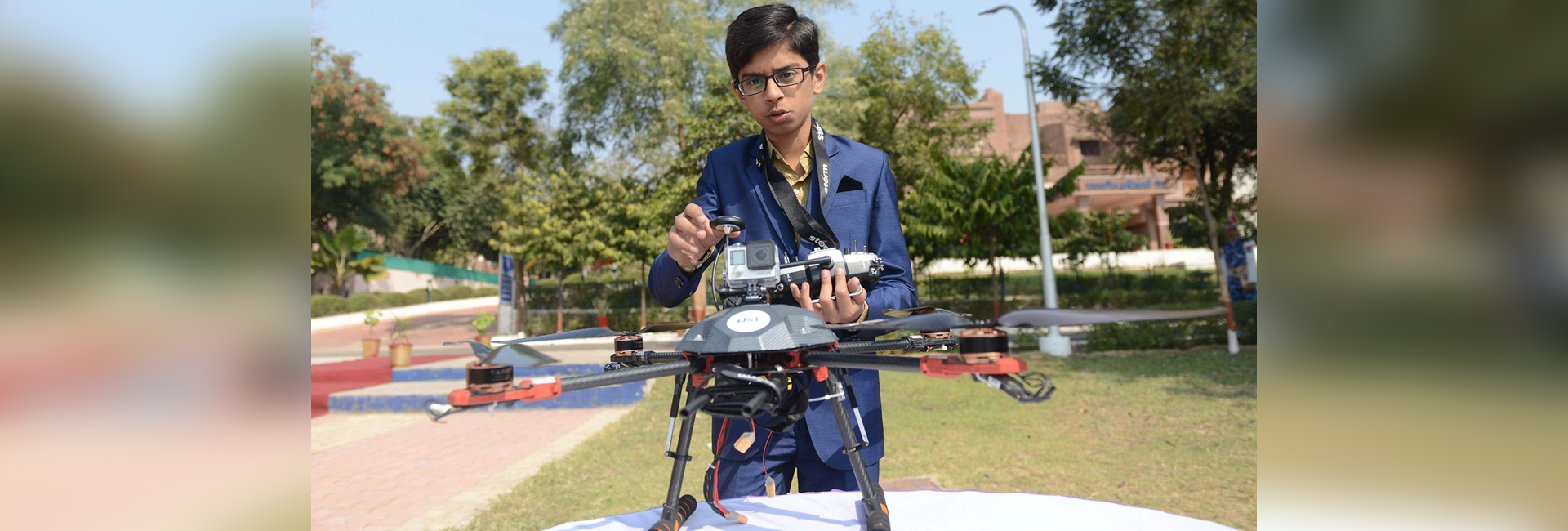(September 18, 2024) A few years ago, when Mannat Kaur witnessed her home tap run dry, she began exploring solutions for the widespread use of greywater (domestic wastewater) to address the water crisis. Little did she imagine that her curiosity and efforts to develop a water-conservation project would eventually lead her to being felicitated by the Princess of Sweden, and attend the Royal Banquet hosted by Sweden’s King Carl XVI Gustaf.
The 16-year-old, class 12 student spent an unforgettable week in Stockholm this August when she travelled to represent India at the 2024 International Stockholm Junior Water Prize, held as part of World Water Week. Winning the national championship at IIT Madras, which led to these remarkable experiences, had already been a golden opportunity in itself.
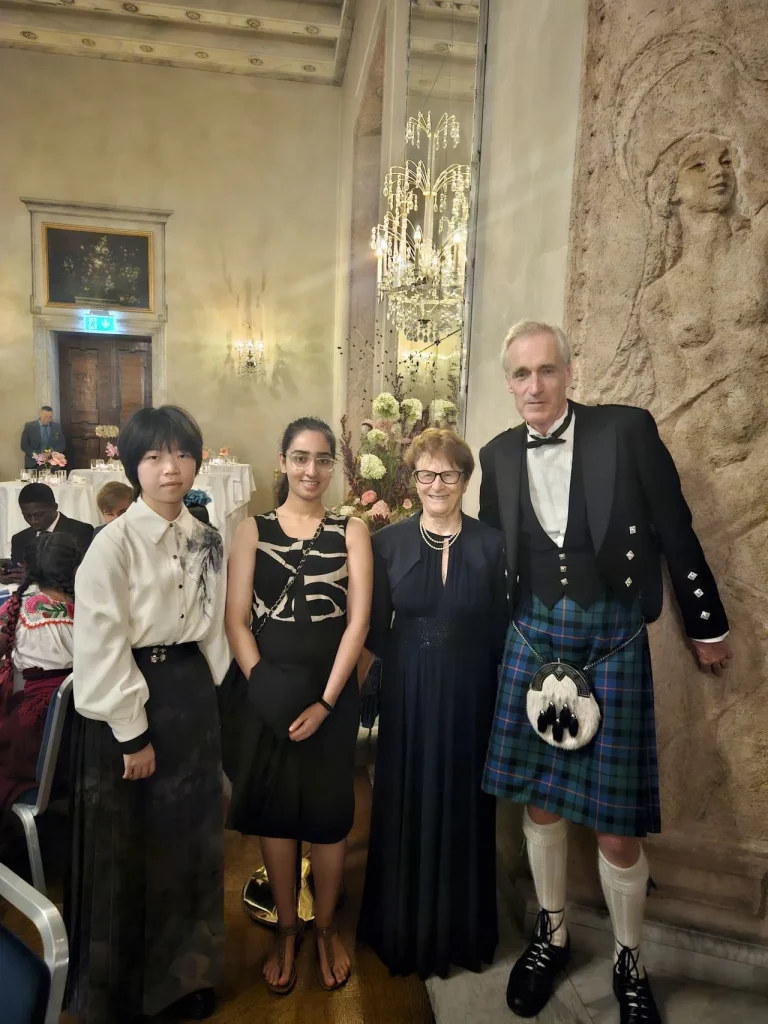
Mannat Kaur at the royal banquet
Accompanied by her father and the national organizer, Prof. Indumathi M. Nambi from the Department of Environmental Engineering and School of Sustainability at IIT Madras, Mannat joined participants from 30 countries for the prestigious event.
Although the United Kingdom took home the international prize, the experience has filled Mannat, the Head Girl of DPS RK Puram, with immense confidence and unforgettable memories. ‘Every moment was unforgettable,’ she tells Global Indian.
The joy of being a national champion
IIT Madras served as the national organizer for World Water Prize. Mannat competed against 350 applicants from 23 states at the national level and emerged as the winner, earning the opportunity to represent her country. “The top 12 shortlisted teams were invited to present their projects in person at the IIT Madras campus, where my project was selected,” Mannat shares.
This was the inaugural year of the Stockholm Junior Water Prize India (SJWP India), an initiative by the Sustainability Venture Studio (SVS) at Indian Institute of Technology, Madras. It was organised in collaboration with the SIWI – Stockholm International Water Institute (SIWI) and sponsored by AquaMAP Center for Water Management and Policy, IIT Madras, to empower young innovators to tackle critical water challenges.
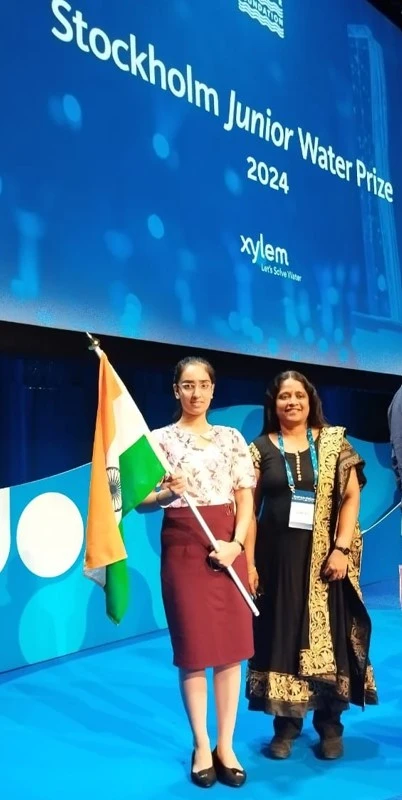

Mannat Kaur with IIT-M Prof. Indumathi M. Nambi in Stockholm
Calling her victory at the national championship a significant personal achievement, Mannat who had dedicated the past four years to this project said, “Receiving recognition at the national level in a competition focused on the water domain is truly rewarding. This recognition has also strengthened my determination to continue contributing to solutions that can have a positive impact on both my country and the world.”
Earlier this year, the youngster had participated in the Genius Olympiad, organised by the US based Rochester Institute of Technology and held at the RIT campus in India where the same project earned her an honourable mention.
The award-winning water project
Mannat’s project is an applied research project which focuses on the development of an indigenous, sustainable, cost effective, decentralized greywater treatment unit which collects, treats, and reuses greywater generated in a household at the source.
“This product driven intervention has two units: Scupper Valve and Bilge Vessel which help households save and fight the water crisis without any major modifications in the current home plumbing system and takes up very little space in the bathroom,” explains Mannat adding, “The preliminary prototype testing demonstrates its effectiveness in collecting and treating greywater to an improved level. The solution also has an image processing component which is able to distinguish effectively between the pre-rinse and post-rinse water from the heavily soapy flows, enabling selective collection of greywaters.
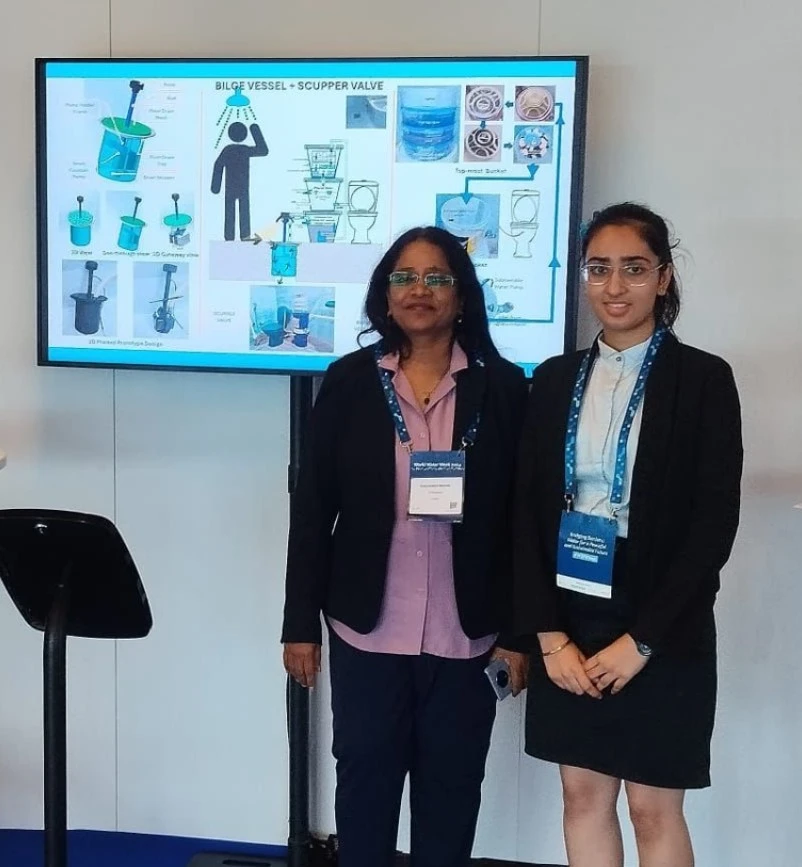

Mannat Kaur with IIT-M Prof. Indumathi M. Nambi in Stockholm
Mannat estimates that a single-family can save around 5,000-6,000 litres of precious potable water per month and can reduce 50% of their water demand if her solution gets implemented. This decentralized approach reduces carbon emissions by 80-85 percent compared to the traditional centralized sewage treatment setups (water pumping and operational energy), offsetting 18,000 tonnes of CO2 emissions annually.
“Additionally, due to lower sewage output, it contributes towards embodied carbon savings linked to the plumbing network infrastructure and construction of sewage treatment plants. This solution, therefore, addresses two main challenges – water scarcity and operational carbon emissions associated with freshwater supply, wastewater treatment and conveyance of treated water,” says the youngster, who has applied for a patent at the Indian Patent Office.
It all started when…
In 2016, during an agitation, Mannat witnessed her home tap run dry as the Munak Canal, which supplies water to Delhi, was breached. Her entire neighbourhood struggled to secure even a single bucket of water. “This incident was a wake-up call, prompting me to explore ways to conserve water,” she says.
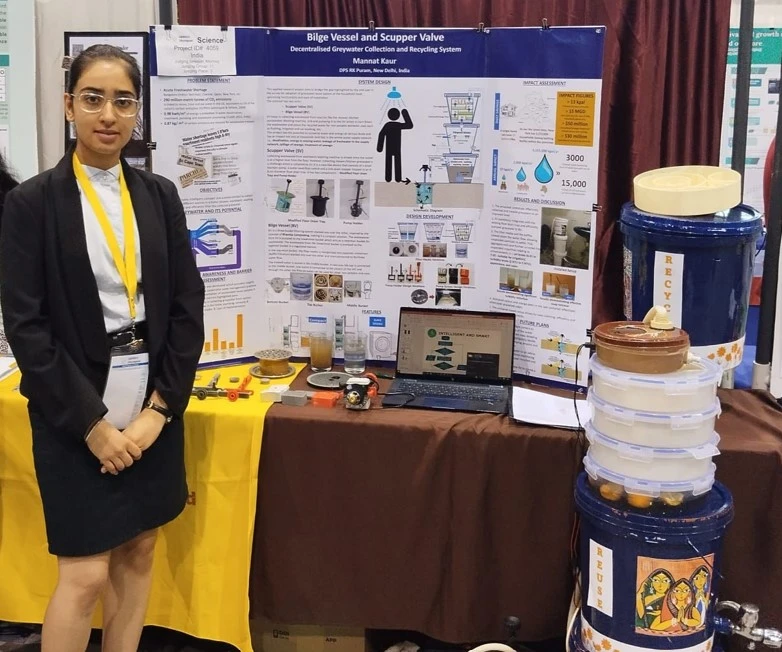

Mannat while showcasing her project during Water Prize national championship at IIT-Madras
She began monitoring her family’s water usage and identifying areas of waste, conducting water audits at home. Mannat noticed a significant amount of water going to waste and observed her family collecting greywater in a tub for reuse in flushing. When she inquired why this practice wasn’t more widespread, she learned that collecting, treating, and reusing greywater requires major retrofit of the toilet and plumbing piping.
“This is how I started looking and developing practical solutions which can be easily implemented and bridge the gap between theoretical knowledge and practical application,” she says.
Experiences at Stockholm
Apart from soaking in the mesmerizing beauty of the European city of Sweden, Mannat got the opportunity to engage in meaningful discussions with experts. She was selected to participate in a talk show titled ‘Bridging Borders and Generations with the Stockholm Junior Water Prize,’ sponsored by Xylem, the U.S.-headquartered global water technology provider. Later engaging with experts from the Xylem team at their office and touring their facilities was great experience for the teenager.
Visiting the Indian Embassy and meeting Chargé d’Affaires, Mr Rakesh Tiwari, was a cherished moment too. Additionally, interacting with Taikan Oki, professor at the University of Tokyo and former Assistant Secretary General at the United Nations who won the 2024 Stockholm Water Prize in the senior category, made her overall experience even more enriching.
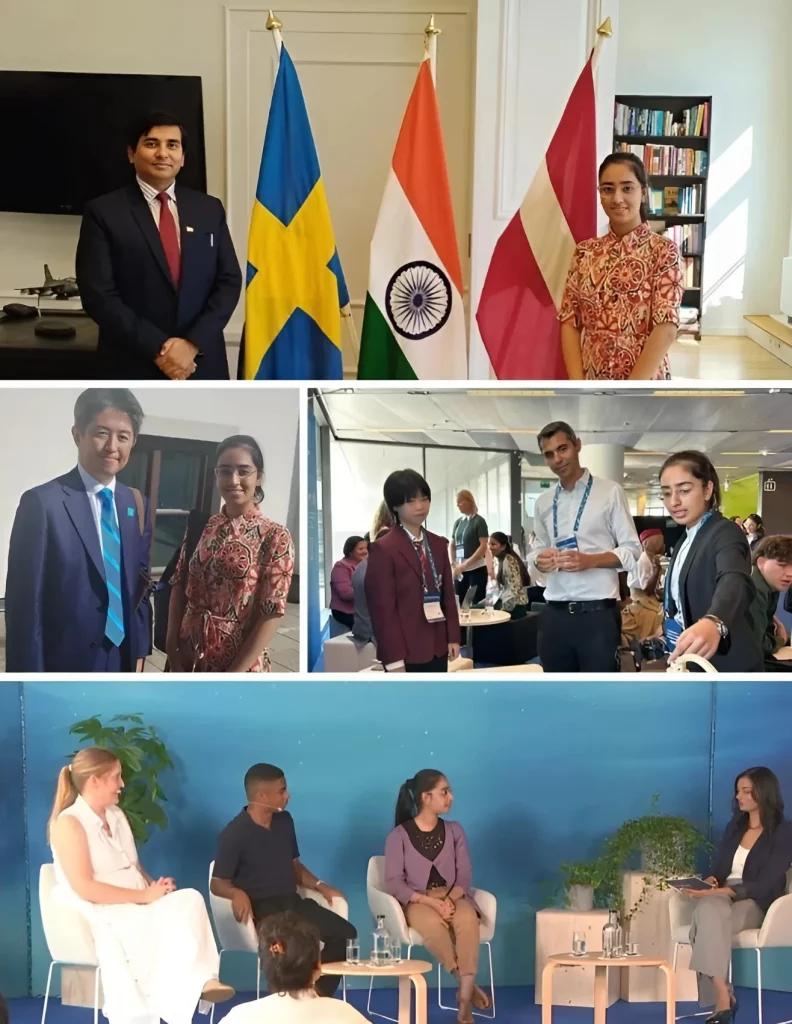

Mannat Kaur at Stockholm
A visit to the Royal Palace, not as a tourist but as an invitee to the Stockholm Water Prize royal dinner and banquet with the King and Queen of Sweden was a once-in-a-lifetime occasion.
Future plan and good influences
Mannat has a deep passion for computer science, machine learning, and emerging technologies. “The myriad challenges that the world has to confront today, such as climate change and water scarcity have ignited in me the desire to work for environmental conservation,” she says adding, “I would like to make use of my technological knowledge to address the impending challenges our generation will inevitably face.”
As a Steve Jobs fan, the youngster believes in proactive resolution rather than passive observation. “I want to impact the world as Steve Jobs had, using technology to change the way we live life. Just as he made personal computing accessible through Macintosh, the first widely sold personal computer (PC), my dream is to make environmental sustainability the easier choice,” she remarks.
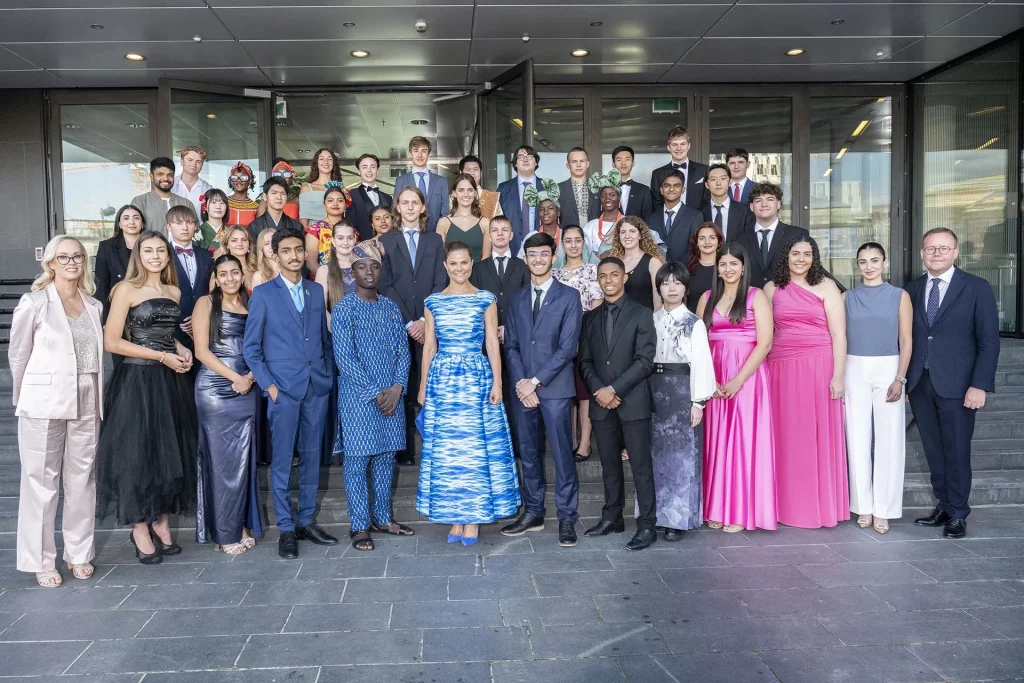

Princess Victoria of Sweden with participants of the Junior Water Prize including Mannat Kaur at Stockholm
Mannat lives in a close-knit family of five which consists of her grandfather, her parents and a younger brother who is in grade 10. Considering herself fortunate enough to have spent some time with her late great-grandmother during the formative years of her life, the youngster mentions “I have inherited my creativity from my architect father and analytical thinking from my mathematician mother, a blend of both has shaped my approach to both life and problem-solving.”
- Follow Mannat Kaur on LinkedIn



